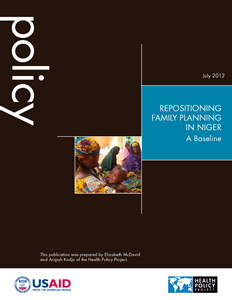The Health Policy Project ended in 2016. Work continued under Health Policy Plus (HP+) until 2022.
PUBLICATION
Author(s): Elizabeth McDavid and Anipah Kodjo
Primary Language: English
Date: 7/25/2012
Abstract:
Demographic pressures and lack of progress toward the Millennium Development Goals have encouraged countries in West Africa to "take a new look" at repositioning of family planning (RFP)---an initiative established to ensure that FP remains a priority for donors, policymakers, and service providers in sub-Saharan Africa. USAID requested that the Health Policy Project apply the newly developed "Framework for Monitoring and Evaluating Efforts to Reposition Family Planning" in Niger and Togo. The framework results represent a baseline that can subsequently be used to measure progress in RFP by country FP stakeholders. USAID also requested an assessment of policy barriers to community-based distribution of FP---the findings for which are included in this report. Niger’s family planning program has made considerable progress in the past five years. Signs of progress are a favorable policy environment, growing public support for family planning, and increased funding for contraceptive commodities. Family planning is provided free of charge and is included in the Minimum Package of Services that all public health facilities must provide. Still, challenges remain to meet unmet need for family planning, extend services to rural areas, and ensure that people have adequate information about contraceptive methods.
To read the results of the application in Togo, view the report and brief, Repositioning Family Planning in Togo: A Baseline.
Applications in six other countries (Benin, Burkina Faso, Guinea, Mali, Mauritania, and Senegal) were later conducted by Futures Group, with funding from the Hewlett Foundation. To access those reports and briefs, visit the Futures Group Publications webpage.
.
Family Planning/Reproductive Health (FP/RH) Policy Report Repositioning Family Planning West Africa


